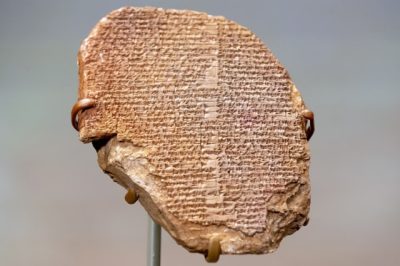Stolen Artefacts: Ancient Looted Gilgamesh Tablet Finally Returns to Iraq
Iraq has recovered 18,000 stolen artefacts, 17,899 of which were found in the US

All Global Research articles can be read in 51 languages by activating the “Translate Website” drop down menu on the top banner of our home page (Desktop version).
To receive Global Research’s Daily Newsletter (selected articles), click here.
Visit and follow us on Instagram at @crg_globalresearch.
***
An ancient tablet from Mesopotamia that contains the Epic of Gilgamesh has been returned to Iraq after being stolen and illegally exported from Iraq by the United States three decades ago.
The Iraqi foreign minister held a press conference on 7 December in Baghdad in which he presented to the culture minister three artefacts recovered from the US and the UK: a Gilgamesh tablet, a ram’s head and a Sumerian tablet.
According to Hassan Nazim, the Minister of Culture and Antiquities, the Gilgamesh tablet is one of the oldest literary texts in Iraq’s history.
At the press conference, he emphasized that he is sending a message to all those who have smuggled antiquities and sold them at auctions abroad, to tell them that, ultimately, restitution will be the result of their illegal actions.
Known as the Gilgamesh Dream Tablet, this $1.7 million cuneiform tablet is one of the oldest surviving works of literature and one of the oldest religious texts. In 1853, it was found in the rubble of Assyrian King Assur Banipal’s library along with a 12-tablet collection.
During the 1991 Gulf War, the tablet was looted from an Iraqi museum. Authorities believed that it was illegally imported into the United States in 2003, then sold to Hobby Lobby, whose Museum of the Bible ultimately featured it.
In 2001, the tablet reappeared in Britain. A US dealer bought it in 2003 from a Jordanian family based in London, then imported the piece without declaring its true nature to customs.
Under a false certificate of origin, it was then sold to antique dealers in 2007 for $50,000.
In the Epic of Gilgamesh, a Mesopotamian king embarks on a quest for immortality. It is regarded as one of the oldest pieces of literature in the world.
Iraq has recovered 18,000 stolen artefacts in a one-year span, of which 17,899 stolen pieces were found in and returned from the United States in the summer of 2021.
The artefacts, which date back around 4,000 years, returned to Iraq mid-July aboard a plane carrying Prime Minister Mustafa Kadhimi from a trip to Washington, where he met US President Joe Biden.
*
Note to readers: Please click the share buttons above or below. Follow us on Instagram, @crg_globalresearch. Forward this article to your email lists. Crosspost on your blog site, internet forums. etc.
Featured image: The Gilgamesh tablet is one of the oldest literary texts in Iraq’s history. (Photo credit: Michael Reynolds, EPA)

